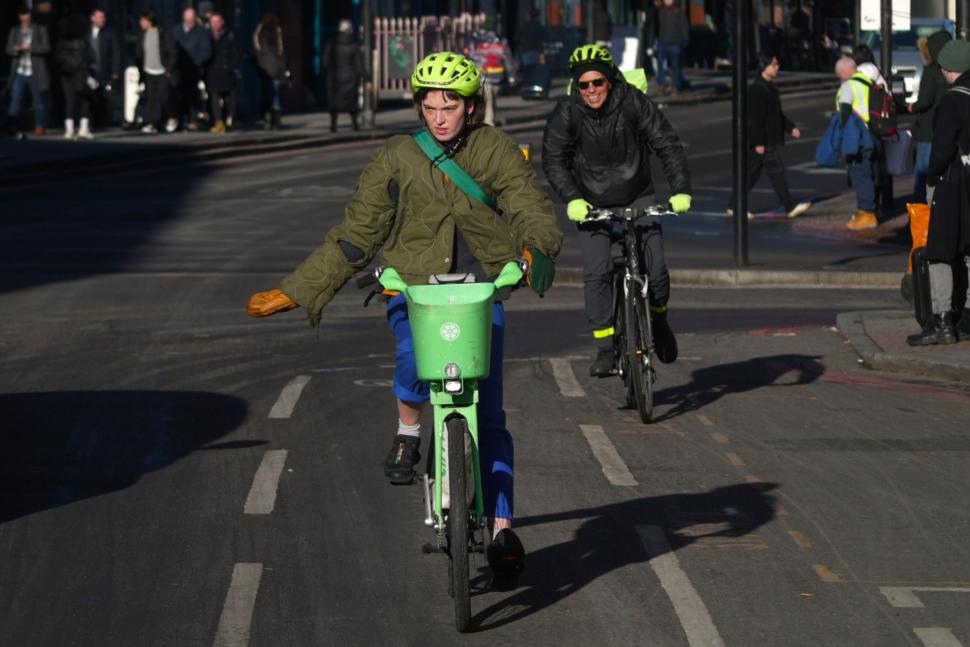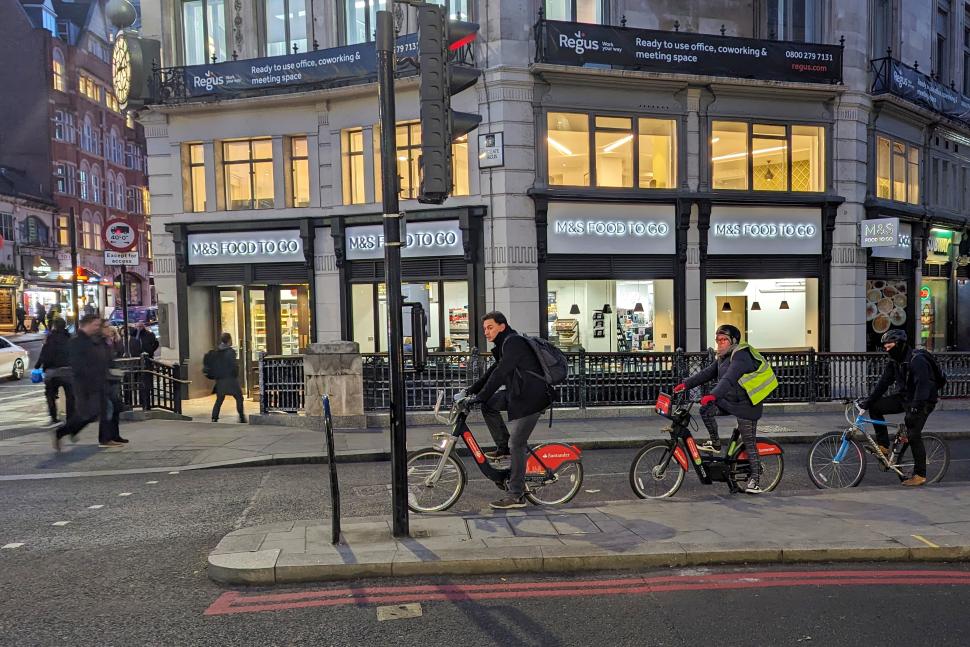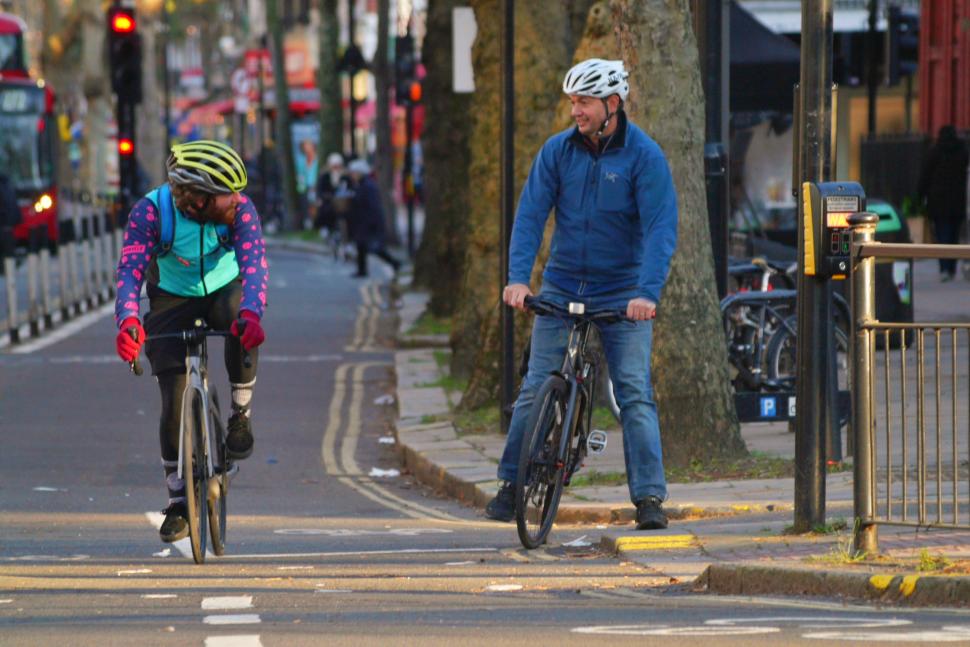- News
- Reviews
- Bikes
- Accessories
- Accessories - misc
- Computer mounts
- Bags
- Bar ends
- Bike bags & cases
- Bottle cages
- Bottles
- Cameras
- Car racks
- Child seats
- Computers
- Glasses
- GPS units
- Helmets
- Lights - front
- Lights - rear
- Lights - sets
- Locks
- Mirrors
- Mudguards
- Racks
- Pumps & CO2 inflators
- Puncture kits
- Reflectives
- Smart watches
- Stands and racks
- Trailers
- Clothing
- Components
- Bar tape & grips
- Bottom brackets
- Brake & gear cables
- Brake & STI levers
- Brake pads & spares
- Brakes
- Cassettes & freewheels
- Chains
- Chainsets & chainrings
- Derailleurs - front
- Derailleurs - rear
- Forks
- Gear levers & shifters
- Groupsets
- Handlebars & extensions
- Headsets
- Hubs
- Inner tubes
- Pedals
- Quick releases & skewers
- Saddles
- Seatposts
- Stems
- Wheels
- Tyres
- Health, fitness and nutrition
- Tools and workshop
- Miscellaneous
- Tubeless valves
- Buyers Guides
- Features
- Forum
- Recommends
- Podcast
 Cyclist in London indicating in cycle lane - copyright Simon MacMichael
Cyclist in London indicating in cycle lane - copyright Simon MacMichaelBetter knowledge of Highway Code changes to protect cyclists and more 20mph speed limits recommended by professor who argues active travel is "best buy" for improving nation's health
A consultant orthopaedic surgeon has made the case for active travel being the "best buy" for improving people's health, publishing a piece in the British Medical Journal (BMJ) arguing that encouraging more cycling and walking journeys should be a priority in the United Kingdom — with better communication of the Highway Code changes designed to protect vulnerable road users, and wider implementation of 20mph speed limits two of her suggestions for helping to "challenge the UK's car dependency and enable active travel for everyone's health".
Professor Scarlett McNally authored the piece published in the BMJ, titled 'Enabling active travel can improve the UK's health', and looked at research around active travel to highlight its health benefits before recommending policy suggestions for bringing about more walking and cycling journeys.
She began by acknowledging the "urgent need to improve the nation's health, which worsened over the pandemic", and noted that an "abundance of evidence and reports" point to exercise being a "miracle cure that improves physical and mental health and reduces demands on NHS services and the need for social care".
"The best forms of exercise are those that fit into everyday life," she continued. "Active travel is a 'best buy' for improving health. Commuting by cycling reduces incidence of, and mortality from, heart disease and cancer by over 30 per cent in a dose dependent manner and reduces sick days and depression."
However, citing Department for Transport statistics which show that 71 per cent of women and 61 per cent of men believe it is too dangerous to cycle on the UK's roads, Prof. McNally suggested the need for segregated safe cycle routes which, when provided, "people use them, as has been demonstrated in Paris".
> Six in ten users of pop-up bike lanes in Paris are new to cycling, says city's government
"In the UK, massive central funds are spent on major roads. Conversely, funds for infrastructure to support active travel are stuck in local council budgets, which are facing a £4bn spending gap," she said before making "four suggestions to support active travel cheaply".
Prof. McNally followed many road safety campaigners and charities, such as Cycling UK, in calling for the Highway Code changes of January 2022, brought in to better protect vulnerable road users, to be better communicated to the public with a "bigger media campaign" about safe overtaking distances, and pedestrian and cyclist priority at junctions.
Secondly, and based on the "horrific injuries I see in orthopaedic and fracture clinics" that get "exponentially worse with every 1 mph increase in speed", she suggested the need to "demand 20 mph limits in all areas where people are".
1/2 A couple of papers for us nerds & some top data:
'Active travel is a “best buy” for improving health. Commuting by cycling reduces incidence of, and mortality from, heart disease and cancer BY OVER 30% Imagine a drug that could do that.
But how....https://t.co/0W7OMH1EBp— Chris Boardman (@Chris_Boardman) March 7, 2024
Looking at the NHS itself, the consultant orthopaedic surgeon argued that the NHS should be "role models" and lead the way on a modal shift from driving to active travel, a transition enabled with pavements in all NHS sites, secure cycle parking, and lockers for wet gear.
"Fourthly, we need to link with other initiatives," she concluded. "Every NHS organisation is required to deliver a 'green plan'. Active travel reduces pollution, which causes catastrophic ill health and harms the planet. Children getting to school under their own steam has huge benefits. Many families cannot afford a second car or live in transport poverty. People being able to get about safely reduces loneliness. Let's challenge the UK's car dependency and enable active travel for everyone's health."
In January, we reported new research published in the International Journal of Epidemiology which found that commuting by bike can improve mental health, with those who cycle to work less likely to be prescribed antidepressants.
"This work suggests that cycle commuting is causally related to reduced mental ill-health and provides further evidence in support of the promotion of active travel to encourage commuters travelling shorter distances to shift to cycle commutes," the University of Edinburgh researchers concluded.
Later in the same month, new research by the Swedish School of Sport and Health Sciences in Stockholm, and published in the British Journal of Sports Medicine, found that boosting cardiorespiratory fitness by three per cent in a year was linked to a 35 per cent lower risk of developing prostate cancer.
Dan is the road.cc news editor and joined in 2020 having previously written about nearly every other sport under the sun for the Express, and the weird and wonderful world of non-league football for The Non-League Paper. Dan has been at road.cc for four years and mainly writes news and tech articles as well as the occasional feature. He has hopefully kept you entertained on the live blog too.
Never fast enough to take things on the bike too seriously, when he's not working you'll find him exploring the south of England by two wheels at a leisurely weekend pace, or enjoying his favourite Scottish roads when visiting family. Sometimes he'll even load up the bags and ride up the whole way, he's a bit strange like that.
Latest Comments
- froze 4 hours 15 min ago
Just my opinion, but sorry that bike is UGLY! I can't see that sort of price for a completed bike, not alone for just the frame and fork!...
- Boopop 4 hours 53 min ago
I find it deeply jarring and disappointing that Sir David agrees with these people not wanting a cycle lane. Whenever I watch one of his excellent...
- chrisonabike 5 hours 2 min ago
May need insurance, tax and a licence. No problem with the lights though.
- Simon E 5 hours 18 min ago
Yes, they look just like the Lezyne Zecto model. My club bought a couple of sets from the LBS for our midweek TTs so if someone turns up without...
- Hirsute 7 hours 49 min ago
If you can't see a %^$&ing large tractor what ^%$£"!*ing hope is there that you will see a cyclist ?...
- chrisonabike 8 hours 7 min ago
Well if you *can* interview the original riders at all surely they worked, at least?...
- David9694 8 hours 36 min ago
Live: Car plunges over wall and lands on beach rocks...
- biking59boomer 8 hours 42 min ago
Looks like yet another bike share service that's going to fold because of selfish idiots.
- brooksby 13 hours 49 min ago
And finally: I wonder how many of the "more than 3,000" signatures on that petition are actually locals, who live or work there (and are not just...



Add new comment
163 comments
I've provided verified ONS data.
If you claim that said data is inaccurate the onus of proof lies with you.
I'm waiting.
Which is not accurate, at best it's a guess. I see why the Eton set call you low hanging fruit.
Evidence to back this up?
You're a fucking child!
No evidence I'm assuming.
Let's just take your word for it...
Sorry, isn't that you only vice versa, or are you secretly a Welsh nationalist?
I wouldn't go so far as to call myself a nationalist but I would actually support Welsh independence if the circumstances were right.
Wales is currently financially dependent on the UK and making an absolute pig's ear out of the devolved public services so now is not the right time.
From an ideological perspective I am in favour of Welsh independence.
Is there no such thing as the English/UK Conservative Party either then? Their official title is also the Conservative and Unionist Party.
But there will be once the union finally collapses.
Highways authorities (either the local council or Welsh ministers, depending on the nature of the road) have the power to propose exceptions to the 20 mph imposition, so the Tory threat that they would abolish all 20 mph limits is unnecessary populist sabre rattling, they could simply allow what they believe are appropriate exceptions to pass and leave the ones outside schools, hospitals et cetera alone. ETA What's preferable, start from a basis of all residential roads 20 mph and then look at roads that might be exempted, or start from a basis of all roads 30 mph and do the same?
That's politics though.
We were already a good way along the process of choosing suitable exemptions from 30mph.
Labour bring in a 20mph default and now we have to start a new process of choosing appropriate exemptions from that.
It's a lot easier to sell 'scrapping the 20mph default' than 'considering more exemptions where appropriate'.
There's now a real risk that we'll end up with fewer 20mph zones than before having expended a huge amount of political time and a fair bit of money alongside it to go backwards.
We should have just stuck to the softly softly approach that was working rather well.
Would that be the 2 year consultation period that Labour had built in? Or are tories now claiming that there is a new consultation period? Is this one of those "40 new hospital" things?
Not if you're pharma shareholders.
Pages